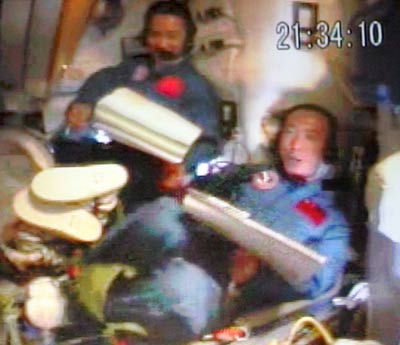
Astronauts Nie Haisheng (left) and Fei Junlong, orbiting the Earth in
the Shenzhou VI spacecraft, talk through phones with their family
members October 12, 2005. China launched its second manned space
mission Wednesday morning. [Xinhua]
(China Daily) Each of them slept for seven hours, walked back and forth between the return and orbital modules of the spacecraft, and conducted a raft of tests.
That was how Chinese astronauts Fei Junlong and Nie Haisheng spent their second day in space on board the Shenzhou VI spacecraft, which was sent into orbit on Wednesday morning.
"The flight of the spacecraft has been normal," the Beijing Aerospace Command and Control Centre said last night.
Also normal was the temperature, blood pressure and other physical signs of the astronaut duo, the centre said in a brief statement.
At 4:16 am yesterday, astronaut Fei woke up from seven hours and eight minutes of slumber in the orbital module and went to his working post in the return module.
Fei and Nie then conducted tests such as closing the return module door, and putting on and taking off their spacesuits in a weightless environment.
At noon yesterday, the pair took turns to move to the orbital module to conduct scientific experiments, the centre said. Wearing blue suits, they were seen videorecording and logging in details of the data obtained from the tests, according to pictures shown on the monitoring screens at the Beijing centre.
The centre did not specify what the experiments were.
But earlier reports said the series of tests included astronauts deliberately using more strength while moving to test the effect of people's movement on the capsule.
The reports said the experiment indicated the astronauts' movement had little effect on the vessel; the craft could maintain its normal flight. "Shenzhou VI is flying normally in its pre-set orbit," the centre said in its statement.
Wu Guoting, an expert with the Chinese Academy of Space Technology, yesterday said that the impact of the movement of one or two astronauts on the heavy spacecraft would be little, let alone "overturning" the craft.
The centre also said that by 7 pm yesterday, the spacecraft had circled the Earth 23 times. Astronauts maintained close contact with ground mission controllers, reporting to them the performance of the spacecraft and how they felt on board.
Also yesterday, Zhang Bainan, chief designer of China's spacecraft system, said that with many modifications and improvements in the series of spacecraft capsules, Shenzhou VIII is expected to become almost the definitive version of China-made space vessels.
Zhang said the designers of the Shenzhou series avoided the defects of Russia's Soyuz vessels.

